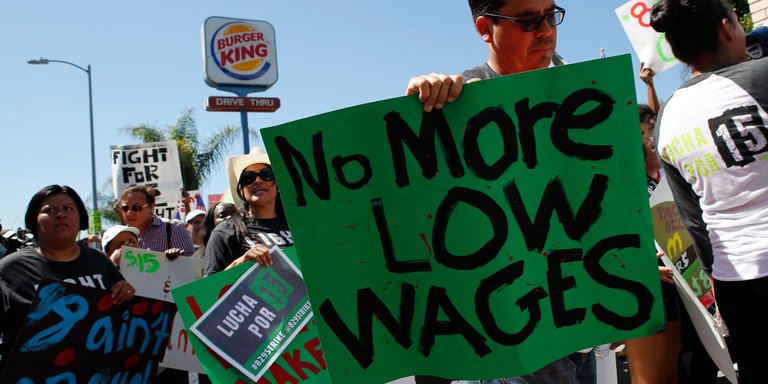
Capitalism is when private producers of goods compete with each other to provide the best service to consumers through the sale of said goods. The exchanges between consumers and providers of goods and services are voluntary and thus inherently win-win. They only occur because involved parties expect to benefit from each exchange.
This process is how prices are determined. Prices are how consumer demand is expressed in terms of finite supply. Without prices, people tend to rapidly consume accumulated capital in the short term, which leads to shortages of capital in the long term. The degree to which the natural discovery of market prices is suppressed is the degree to which market distortions (like booms and busts) occur.
Absent market intervention, the power to determine prices is completely in the hands of consumers. Sellers can only sell for the prices consumers are willing to pay. All other things being equal, profit is a sign of efficiency, high demand and/or good customer service. All other things being equal, loss is a sign of waste, low demand and/or poor customer service. When someone operates at a loss, the market is saying that there are more efficient uses for their resources. When someone operates at a profit, it sends a signal to the market which attracts competition. Competition for consumer satisfaction and market share drives down cost while driving up quality and efficiency. This process drives marginal producers of goods whose operation costs are closest to current market prices out of business or into different areas of trade, thereby freeing up their resources to be used for more efficient purposes.
This process is a net benefit to all consumers but it does have its losers: the people who provide inefficient, poor quality services.

The demand for government intervention in markets is therefore created by market losers, or people who make comparatively wasteful use of resources. Minimum wages, welfare, guaranteed home and school loans, bank bailouts, regulations, tariffs, taxes, grants, subsidies, price controls, government protected monopolies - all of these things exist to protect market losers from market competition by shifting their risk and loss onto everyone else (including people who aren't even born yet, if you consider the "national debt"). Interventionism is therefore inherently win-lose.
It is logically impossible to create a greater amount of market winners through win-lose interventionism than would have otherwise occurred through win-win consensual exchange. This is basic logic.
Patching over the failures of market losers with government intervention in markets distorts the market and creates more market losers. The increased number of market losers creates an increased demand for government intervention in markets, the establishment of which creates even more market losers. This even greater number of market losers creates an even greater demand for government intervention in markets, the establishment of which.... you get the idea.
Interventionism is inherently wasteful, inefficient and corrupt, and it's a defining characteristic of socialists, fascists and mercantilists/"crony capitalists" alike. It's the reason the size of the state ballooned out of control, and it's the reason why there's no difference between the political right and the political left (or even political so-called "independents"). The only alternative to abandoning interventionism in favor of laissez-faire is a death march into totalitarian communism, and the blame will be entirely on partisans, those who enable their superstitious delusions of authority, the authoritarians they put in power and those who follow their orders.
The idea that leftists care about equality is a joke. The idea that conservatives care about free markets is a joke. The thing statists primarily care about is using the false authority of "the state'" (which is a superstitious delusion) to slice the market up for themselves so that they can be protected from competition.
I'm Jared Howe! I'm a Voluntaryist hip hop artist and professional technical editor/writer with a passion for Austrian economics and universal ethics. You can catch my podcast every Friday on the the Seeds of Liberty Podcast Network.

I pray that this is simple enough for even the most stubborn economic illiterates to grasp. If not, hope for any semblance of a bright and enlightened future tragically wanes. You have once again summarized what should be widely understood and acknowleged concepts, into a succinct and cogent essay that I, for one, found quite enjoyable.
Upvoted, liked, shared, etcetera.
Keep up the good work, Jared!
"If not, hope for any semblance of a bright and enlightened future tragically wanes"
I'll keep trying either way. I appreciate you James.
Crushing the economics of idiots I love it.
lol crushing the economics of idiots hahahahhaha the (Bernie sanders of the world) -markie